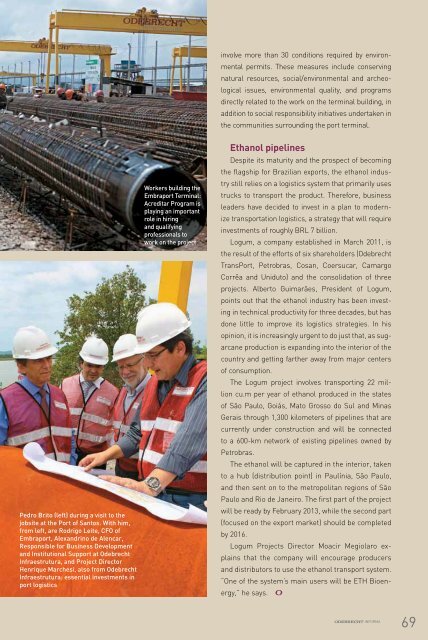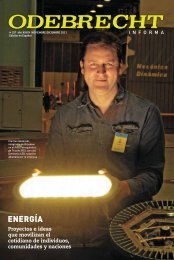THIS IS HOW THE PATH IS BUILT - Odebrecht Informa
THIS IS HOW THE PATH IS BUILT - Odebrecht Informa
THIS IS HOW THE PATH IS BUILT - Odebrecht Informa
Create successful ePaper yourself
Turn your PDF publications into a flip-book with our unique Google optimized e-Paper software.
involve more than 30 conditions required by environmental<br />
permits. These measures include conserving<br />
natural resources, social/environmental and archeological<br />
issues, environmental quality, and programs<br />
directly related to the work on the terminal building, in<br />
addition to social responsibility initiatives undertaken in<br />
the communities surrounding the port terminal.<br />
Pedro Brito (left) during a visit to the<br />
jobsite at the Port of Santos. With him,<br />
from left, are Rodrigo Leite, CFO of<br />
Embraport, Alexandrino de Alencar,<br />
Responsible for Business Development<br />
and Institutional Support at <strong>Odebrecht</strong><br />
Infraestrutura, and Project Director<br />
Henrique Marchesi, also from <strong>Odebrecht</strong><br />
Infraestrutura: essential investments in<br />
port logistics<br />
Workers building the<br />
Embraport Terminal:<br />
Acreditar Program is<br />
playing an important<br />
role in hiring<br />
and qualifying<br />
professionals to<br />
work on the project<br />
Ethanol pipelines<br />
Despite its maturity and the prospect of becoming<br />
the flagship for Brazilian exports, the ethanol industry<br />
still relies on a logistics system that primarily uses<br />
trucks to transport the product. Therefore, business<br />
leaders have decided to invest in a plan to modernize<br />
transportation logistics, a strategy that will require<br />
investments of roughly BRL 7 billion.<br />
Logum, a company established in March 2011, is<br />
the result of the efforts of six shareholders (<strong>Odebrecht</strong><br />
TransPort, Petrobras, Cosan, Coersucar, Camargo<br />
Corrêa and Uniduto) and the consolidation of three<br />
projects. Alberto Guimarães, President of Logum,<br />
points out that the ethanol industry has been investing<br />
in technical productivity for three decades, but has<br />
done little to improve its logistics strategies. In his<br />
opinion, it is increasingly urgent to do just that, as sugarcane<br />
production is expanding into the interior of the<br />
country and getting farther away from major centers<br />
of consumption.<br />
The Logum project involves transporting 22 million<br />
cu.m per year of ethanol produced in the states<br />
of São Paulo, Goiás, Mato Grosso do Sul and Minas<br />
Gerais through 1,300 kilometers of pipelines that are<br />
currently under construction and will be connected<br />
to a 600-km network of existing pipelines owned by<br />
Petrobras.<br />
The ethanol will be captured in the interior, taken<br />
to a hub (distribution point) in Paulínia, São Paulo,<br />
and then sent on to the metropolitan regions of São<br />
Paulo and Rio de Janeiro. The first part of the project<br />
will be ready by February 2013, while the second part<br />
(focused on the export market) should be completed<br />
by 2016.<br />
Logum Projects Director Moacir Megiolaro explains<br />
that the company will encourage producers<br />
and distributors to use the ethanol transport system.<br />
“One of the system’s main users will be ETH Bioenergy,”<br />
he says.<br />
informa<br />
69
















